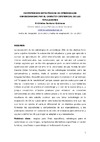Please use this identifier to cite or link to this item:
https://accedacris.ulpgc.es/jspui/handle/10553/41329
| DC Field | Value | Language |
|---|---|---|
| dc.contributor.author | Santana Quintana, Cristina | en_US |
| dc.date.accessioned | 2018-06-19T16:45:13Z | - |
| dc.date.available | 2018-06-19T16:45:13Z | - |
| dc.date.issued | 2018 | en_US |
| dc.identifier.issn | 1577-6921 | en_US |
| dc.identifier.other | Scopus | - |
| dc.identifier.uri | https://accedacris.ulpgc.es/handle/10553/41329 | - |
| dc.description.abstract | La adquisición de las estrategias de aprendizaje (EA) en los idiomas tiene como objetivo fomentar la autonomía del estudiante y para que aprenda a agilizar su aprendizaje de L2/L3 intensificando sus competencias y sus niveles motivacionales. Las conclusiones que se extraen del presente trabajo sugieren que las EA más apropiadas para las características de los aprendices del Grado en Turismo en la Universidad de Las Palmas de Gran Canaria (Islas Canarias, España) son las estrategias indirectas como las comunicativas y sociales, dado el carácter social y comunicativo del lenguaje turístico. Estas EA adquieren una gran relevancia en el aprendizaje del “lenguaje de la hospitalidad” porque buscan oportunidades para usar el idioma, incrementan el contacto con otros aprendientes o con hablantes nativos al poner en práctica el aprendizaje y el uso de la nueva lengua, y porque desarrollan actitudes positivas para entender las diferentes convenciones sociales entre la cultura propia y la de la nueva lengua. Los resultados de este estudio plantean que una única metodología en la adquisición de EA no puede servir para todas las titulaciones sino que hay que tener en cuenta el carácter diferencial de los distintos grados para fomentar las capacidades y competencias de sus especialidades, y los profesores debemos ser conscientes de esta circunstancia para intervenir y ayudar a definir las EA que mejor se adapten a sus necesidades. | en_US |
| dc.description.abstract | The acquisition of language learning strategies (LLSs) aims to encourage students’ autonomy and to improve their learning of L2 / L3, so they could development their learning competence and motivational levels. The conclusions from the present study suggest that the most appropriate LLSs for the characteristics of the Degree in Tourism learners at the University of Las Palmas de Gran Canaria (Canary Islands, Spain) are indirect LLSs such as the communicative and social strategies due to the social and communicative nature of tourism. These LLSs have great relevance in learning the "language of hospitality" as students are looking for opportunities to use the language to increase their contact with other learners or with native speakers, to use the new language in real situations, and to develop positive attitudes to understand the different social conventions among the cultures. The results of the study suggest that the use of just one methodology in the acquisition of LLSs cannot be employed in all degrees, but that the different studies must be taken into account in order to promote the skills and competences of their specialties. The teachers should be aware of this circumstance to help the students find the appropriate LLSs for their needs. | en_US |
| dc.language | spa | en_US |
| dc.relation.ispartof | Tonos Digital | en_US |
| dc.source | Tonos Digital [ISSN 1577-6921], n. 34 | en_US |
| dc.subject | 57 Lingüística | en_US |
| dc.subject | 570111 Enseñanza de lenguas | en_US |
| dc.subject.other | Foreign Language Skills In The Tourism Sector | en_US |
| dc.subject.other | Language For Specific Purposes | en_US |
| dc.subject.other | Language Learning Strategies | en_US |
| dc.subject.other | Learning | en_US |
| dc.subject.other | Teaching In Higher Education | en_US |
| dc.title | Competencias estratégicas de aprendizajes condicionadas por el carácter diferencial de las titulaciones | en_US |
| dc.title.alternative | Strategic learning competences conditioned by the differential character of the degrees | en_US |
| dc.type | info:eu-repo/semantics/article | en_US |
| dc.type | Article | en_US |
| dc.identifier.scopus | 85047869822 | - |
| dc.contributor.authorscopusid | 57201505368 | - |
| dc.identifier.eissn | 1577-6921 | - |
| dc.identifier.issue | 34 | - |
| dc.investigacion | Artes y Humanidades | en_US |
| dc.type2 | Artículo | en_US |
| dc.utils.revision | Sí | en_US |
| dc.date.coverdate | Enero 2018 | en_US |
| dc.identifier.ulpgc | Sí | en_US |
| dc.contributor.buulpgc | BU-EGB | en_US |
| dc.description.sjr | 0,116 | |
| dc.description.sjrq | Q3 | |
| dc.description.dialnetimpact | 0,0 | |
| dc.description.dialnetq | Q2 | |
| dc.description.dialnetd | D3 | |
| dc.description.erihplus | ERIH PLUS | |
| item.fulltext | Con texto completo | - |
| item.grantfulltext | open | - |
| crisitem.author.dept | GIR IATEXT: División de Estudios de Corpus y Lingüística Aplicada | - |
| crisitem.author.dept | IU de Análisis y Aplicaciones Textuales | - |
| crisitem.author.dept | Departamento de Filología Moderna, Traducción e Interpretación | - |
| crisitem.author.orcid | 0000-0003-2985-2832 | - |
| crisitem.author.parentorg | IU de Análisis y Aplicaciones Textuales | - |
| crisitem.author.fullName | Santana Quintana, María Cristina | - |
| Appears in Collections: | Artículos | |
Page view(s)
157
checked on Sep 27, 2025
Download(s)
136
checked on Sep 27, 2025
Google ScholarTM
Check
Share
Export metadata
Items in accedaCRIS are protected by copyright, with all rights reserved, unless otherwise indicated.
